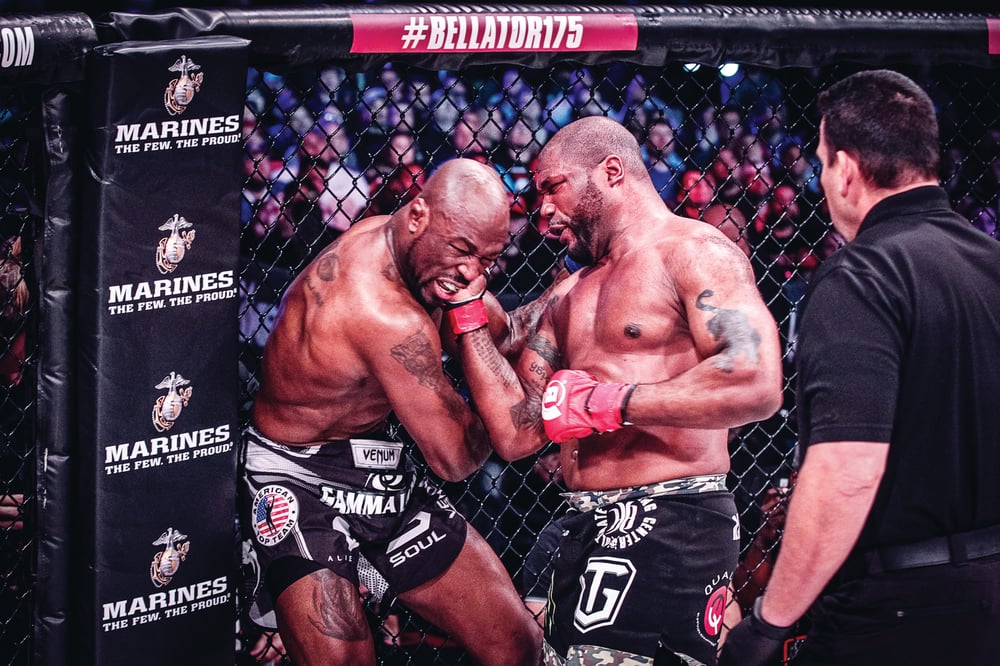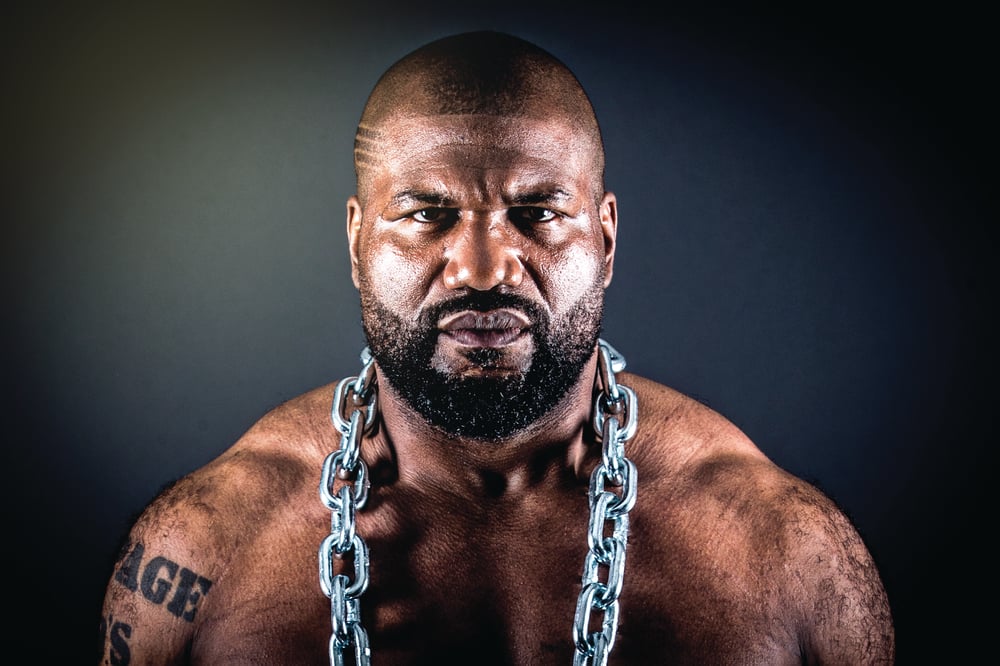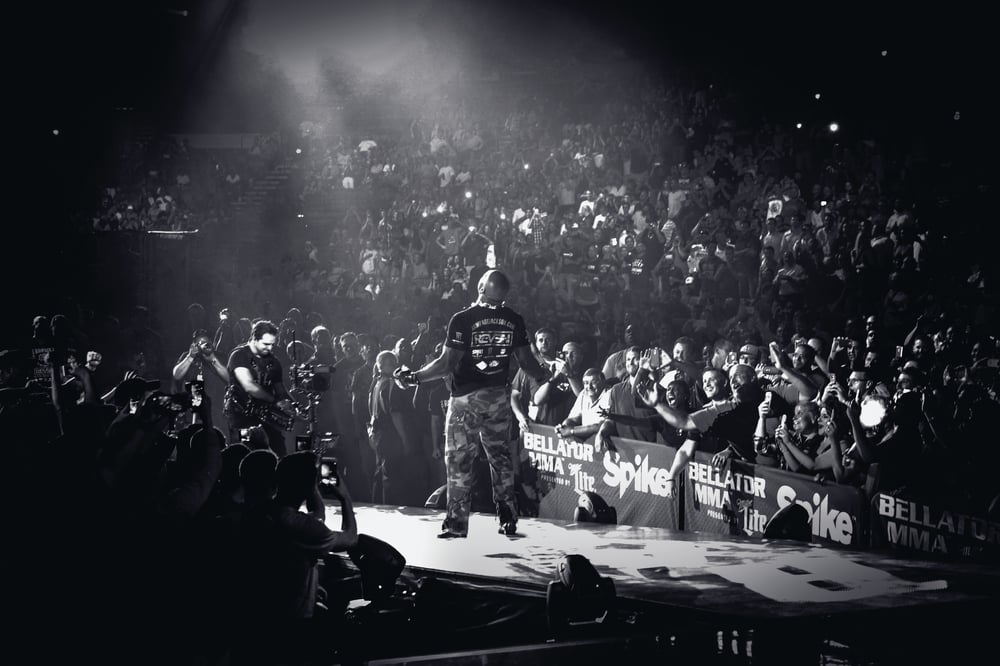
Issue 166
April 2018
Quinton 'Rampage' Jackson says he was never in it for the glory. He wants to be remembered for being an entertainer who kicked ass and knocked people out.
Quinton ‘Rampage’ Jackson had just lost. By decision. In his words, ‘by leg hump’. Again.
The American mixed martial artist, an icon who had dabbled in acting and professional wrestling, huge shoulders hunched over – almost symptomatic of his career as he approaches 40 years of age – walks slowly up the VIP ramp out of The Forum in Los Angeles, surrounded by his small entourage; past fans, past reporters, past the ongoing press conference with its victors and vanquished, without saying a word.
On he went, past the names on the red wall of fame bearing all the great acts from the musical diaspora which had performed at the iconic venue before him: The Who, Led Zeppelin, The Doors, Bob Dylan. Names of the sonic greats which we still listen to… but in reality, belong to a bygone era. Perhaps like Rampage himself.
Time catches up. Trips us, denies us, blurs past achievements. And time never treats fame kindly. “Fame can take interesting men and thrust mediocrity upon them,” said the late, great David Bowie.
Out sloped our larger-than-life character and into the night, fighting thoughts about his own mediocrity. Defeated, unsure of his future, dealing with the disappointment of the present. Back in the arena, the talk was of ‘if only’...
If only Rampage could have landed his heavy hands on Chael Sonnen. If only he could have knocked his foe out. If only he had lit up the arena one more time.
You could feel it during the fight.
The crowd willing him on. Noisily. And silently. Praying almost. All they had wanted at the iconic venue was for Rampage to knock his opponent out. For the roof to come off. It was tangible. Even modern fighters like Nate Diaz, sitting within the VIP area, had wanted just that, too. In truth, perhaps we all wanted it. But you don’t always get what you want.
“I don’t mind people going for takedowns and wrestling me,” explains Rampage. He is irked. “But if you take me down, try to finish me. It’s about having an exciting fight. I got into fighting as a pro wrestling fan. That’s what led me to wrestle in high school. I was never an MMA fan. Sad to say I’m still not an MMA fan. I like to do it more than I like to watch it. Fighting has evolved so much that parts of it have evolved into a boring state.”
Jackson, matched with Sonnen in Bellator’s heavyweight tournament and stymied by his fellow American in that headline fight at The Forum, felt dismayed by the draw in the first place, and disappointed with the outcome against Sonnen.
“I would have been more excited if I’d been matched with someone else who is known to give you a fight. Fedor Emelianenko or Roy Nelson. Even Frank Mir. If he takes you down, he’s trying to submit you. I had just fought a boring fight against a wrestler in Mo Lawal. Why did I have to do another one back-to-back? I’m not excited to fight a fighter who has a plan to hold you down for 15 minutes.
“If I was a promoter and I had a guy named Rampage who likes to slam people and knock them out, the last thing I’d do is put him in against people who try to hold him down. Why? I’d put me up against other guys who are game to fight so I can make the most exciting fights. Especially if Rampage is up in years and ready to retire. I’d get my money’s worth out of him.”

It is like that with Rampage now. He wants to deliver, only in a certain way. But in some ways, Rampage is everything that is unforgiving about these modern times. You hear his lament. You sympathize. But there is little that you can do. Time passing again.
Yes, there are contests left for him as a legend of the sport, within Bellator, against other aging names. He still wants those fights with Wanderlei Silva and the aforementioned Fedor. And no doubt he will meet them in a combat arena in Bellator.
Yet the feeling persists that aging warriors, like Rampage, are simply chasing time in a battle they will always lose.
Jackson, fighting against becoming a parody of himself, yet still clearly a huge fight celebrity, might be widely perceived today as a faded fighter by the generation baying for the return of Conor McGregor, but time was when Rampage was ‘The Man’, the UFC’s light heavyweight champion, a title he unified with the Pride middleweight championship at 205lb against Dan Henderson.
There was a time when Rampage created music in the combat arena. When his name was music to the ears of promoters. He is one of the best fighters to step in a cage.
It feels like a long time ago now, but it was some journey to get there. From the grassroots fighting promotions of the USA to the biggest shows in Japan, Rampage made his name. He was better known in Japan, a country and culture within which he still holds a great affinity, but when Jackson returned in 2007, to the World Fighting Alliance and into the hands of the UFC, a new larger-than-life star fitted into the template the movers and shakers in the sport wanted. He had it all.
He had raised himself on the streets of Memphis, Tennessee as a teenager, and when Rampage found out he could beat people up in a cage instead of having street fights, two things had become clear to him: one, he would not be sent to jail. And two? That he could get paid for it. Something he loved. Something that he was deeply adept at.
Due to his personality and aggressive fighting style, Jackson became a star during his stint with Pride FC and following his move to the UFC, he helped pioneer MMA’s growth into a worldwide sport.

Rewind that decade back and the landscape for the fighter at the peak of his powers, in his very late twenties, looked so different. Yet styles have changed, the names are different, the sport has spread and diversified its sports science and smart fighting methodology. And all Rampage wants to do is indulge in a stand and bang, toe-to-toe, mano a mano fistfight in a cage on a Saturday night. Knockout, or be knocked out. Old school.
“I want to get in the cage and entertain my fans. I want to try and knock somebody out or get knocked out doing it. I don’t want to go out there and fight and be lying on my back the whole fight and have a boring fight and the fans are booing,” he says.
“I don’t know why promoters love fights like that. I don’t understand it. I’ve only got a few more fights. Don’t you want to see me doing what I like to do? I stand and bang with people and if they mess up I slam them. All I want to do is make the fans cheer.
“Why put me in with fighters saying they’re going to hold me down? If I was a promoter I’d kick out all those leg-humping wrestlers and give them their own league. I will only employ fighters who want to excite the fans and give them their money’s worth. Do you like to pay to watch men hump on another man?
“I didn’t name myself Rampage. I’m not saying I don’t want to wrestle. I wrestle, I’ve done wrestling. I don’t care. I just want to fight.”
Rampage has long held the belief, and has said many times, that it all happens for a reason.
When he came to the UFC, Rampage was one of only a handful of fighters to have defeated the incumbent UFC champion, Chuck Liddell, when he joined the organization’s light heavyweight division in 2006.
There was a blip on Liddell’s 23-fight record – that loss to Quinton Rampage Jackson in 2003 in Pride – and the big bad motormouth was happy to accept the return match with Liddell in the UFC.
Liddell came into it riding high with seven straight wins on his record and the belt around his waist. He was a heavy favorite heading into the contest. Rampage went into the fight with that familiar don’t-f*ck-with-me snarl, but his eyes gave it away. He was nervous. But against the expectations of the crowd, when the fight began, a transformation took place.
Jackson was focused and cool as a cucumber. His boxing training had paid off, and a meteorite of a hook followed up by a series of brutal right hands led to Big John McCarthy intervening to stop the fight. It had taken 113 seconds.

Jackson was jubilant in what became a defining moment, if not the defining moment of his career. He had captured the light heavyweight championship, netting himself just short of half a million dollars. He had propelled himself from quiet obscurity to mainstream celebrity at the age of 29.
He had it all in front of him, including that unification bout in London as the UFC expanded its kingdom into Europe. Another victory, this time over Dan Henderson, made him even bigger, but the times were changing.
He lost his title, then came more losses. Gone was his rampaging wrestling; he just wanted to strike, and losses followed to those who were more willing to mix things up. Rashad Evans, then coming force Jon Jones. Then more defeats, first to Ryan Bader, then Glover Teixeira.
There was disillusion perhaps. He didn’t like the way opponents game-planned their way to victory instead of ‘fighting’ him. Fan criticism made him reflect on his time in the Far East. “Japanese fans are more respectful,” he said. In the West, “they swing from loving to booing guys.” He’d never been booed in Japan – not once. He feels that MMA fans in the west think “you owe them something”.
He adds: “I think the fans do forget. I don’t think they give us enough respect a lot of the time. If we get old, they call us ‘has-beens’. You get a lot of positive people, but there are more negative fans. They are like, ‘What have you done for me lately?’ We lose one fight and they call us bums. We deserve respect.
“When I used to fight in Japan, I was popular and people asked me for pictures. It was nice. When I came home, no one knew who I was. That was the perfect life.”
“There have been times when I fought for less money and didn’t agree with the money I was making. But since then, the world has changed and everybody’s got a phone on them. Sometimes I feel like a zoo animal. People are always asking for a picture. After a thousand of those, it gets old.
“You still love the fans, but I know the true Rampage fans never come up to me like that. They say, ‘Hey Rampage, how are you doing?’, and they give me five. They know me. They’ve seen my interviews and watched me on The Ultimate Fighter. They know me. They feel like they’re close to me and know how to talk to me. But people who know who I am just come up to me and will be like, ‘Can I get a pic?’. They don’t know me. They just know my name. I do really feel like a zoo animal sometimes.”
The sport, he believes creates character. And indeed, approachable characters. “Fighters are so accessible. Most MMA fighters don’t have loads of followers. Some of the UFC guys do. I can read every comment on my page.
"I enjoy getting back to people and talking back to fans on social media. I just ban negative people right away. Still, they get there and they say something. I’m a human being. I have way more fans that are positive than negative, but this is just something we deal with that people don’t understand. Right now, I’m very happy with Bellator. I wish that all my career I could have been this happy. Happy with my purse, happy with the way I’m being treated.”

Jackson was desperate to win the Bellator heavyweight tournament. Desperate to hold the belt, to regain standing in his career, return triumphant. But as we know, time waits for no man, or woman, in the world of sport. And especially in fight sports. Each great fighter has their time.
“Look, I’m a big kid. I like to laugh, have fun, joke around. If you had a positive experience with me that means you were positive. I’ve never fought for glory or anything, that’s never been my motive. I’ve always kept it real and let everyone know it’s my career and job. It’s the same reason doctors go into medicine. They want to heal people but they want to be successful. I want to entertain people, kicking ass, but I want to be successful. That means helping family and friends; putting my kids through college.”
And as he made his way up the slippery slope that night at The Forum, the old warrior would have been hurting inside and outside, the clock ticking on the inevitable end.
“I have to work, to make money, to feed my kids,” says the man raging against the dying of the light. The mantra is still the same. The body, if not the desire, is fading. When great warriors age, MMA is unforgiving.
Missing link
At his height, ‘Rampage’ was one of the biggest stars in combat sports. Whether fans saw him acting up for the cameras on reality TV and at press conferences, or slamming and knocking folks out in the cage, people wanted to see him. It’s why he’s one of the few people (with Rashad Evans) not named Brock, Conor or Ronda to generate more than a million pay-per-view buys for a single event.
It’s this star power, he feels, that is missing from the sport now. He says promoters should be emphasizing popular athletes over their brands.
“Take two logos and put them in that cage. Who is going to show up to buy the PPV or show up to watch two logos fight? It’s the fighters who have the brand,” he says. “If promoters figure out a way to keep the fighters happy, those fighters will tell other fighters. The promotion that keeps their fighters, treats them how they deserve to be treated and keeps them happy, will win. Hands down.”
...









